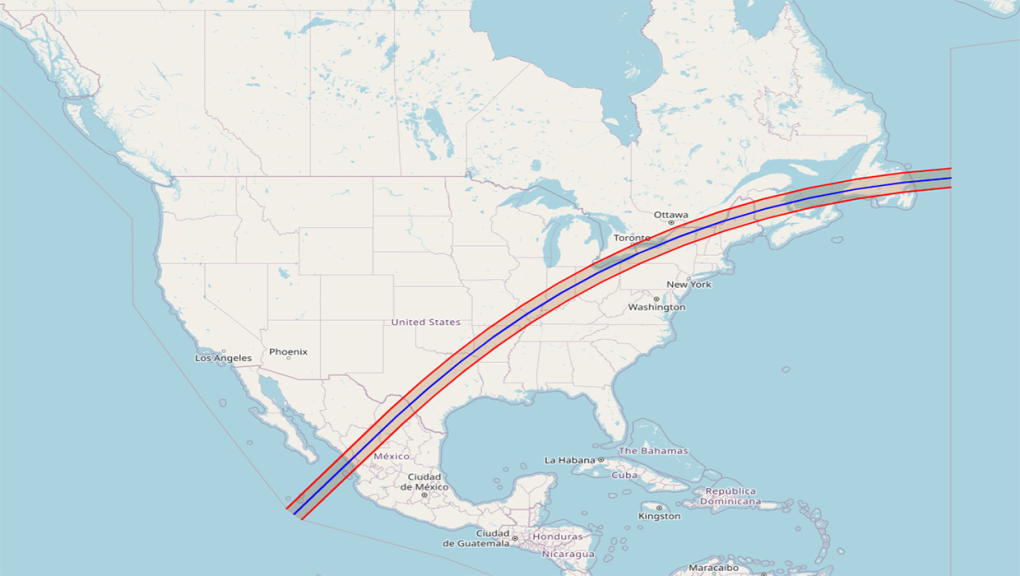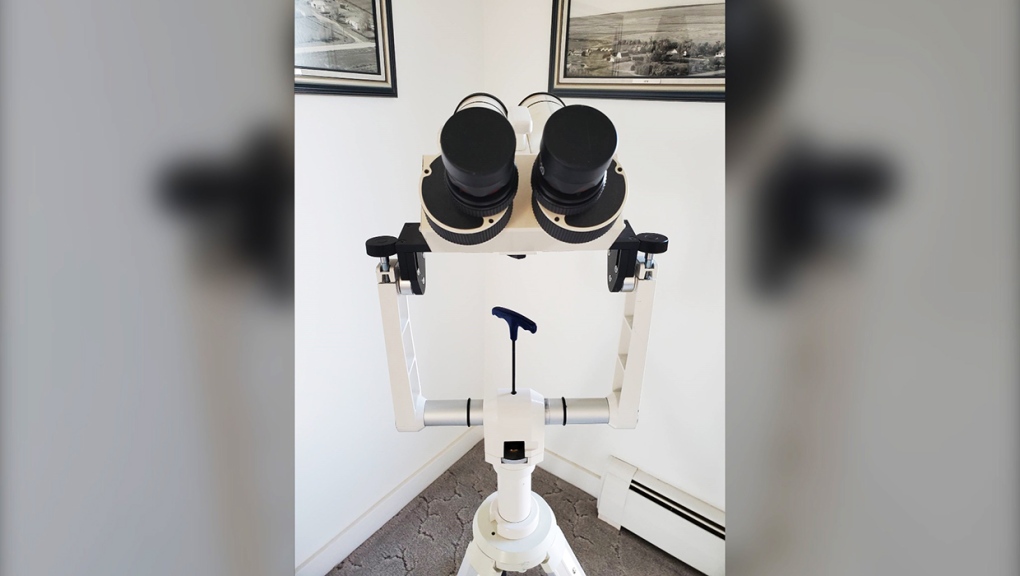Canada to witness rare total solar eclipse in 2024
For the first time in 52 years parts of Canada will experience a rare total solar eclipse on Monday, April 8.
The path of this total solar eclipse will begin its North American journey on Mexico’s pacific coast at around 11:07 am PDT according to NASA.
From there it will journey through Texas and up through the United States until it enters parts of Southern Ontario in the late afternoon.
The eclipse will exit Newfoundland at around 5:16 pm NDT.
 The expected trajectory of the 2024 solar eclipse. (Photo: eclipse2024.org)
The expected trajectory of the 2024 solar eclipse. (Photo: eclipse2024.org)
(photo: eclipse2024.org)
“A lot of solar eclipses are not in convenient places,” explains Neel Roberts from the Royal Astronomical Society of Canada (RASC), Calgary Centre. “They are either in the ocean or in places where people don’t live and sometimes they are not easily accessible. This [total solar eclipse] is actually accessible by over half of the country and you can go by road or even by boat to see this thing. So it’s a legacy thing, it’s something that if you take your kids that they will remember this event.”
So what happens during a total solar eclipse?
Roberts witnessed the phenomena firsthand in Idaho in 2017 and recalls for a few minutes, daylight vanished into darkness.
“It was really life-changing,” he recalls. “It was about 80 degrees Fahrenheit that day and it dropped to about 60 F and it stays down for about 10 minutes because that’s when the moon is shadowing the sun.”
He adds he could see a pink hue along the horizon due to the refraction of the corona.
“You’ll also notice the animals go quiet for a very short period of time because they think its bedtime.”
When preparing to witness a total solar eclipse, Roberts recommends safety first by investing in proper eyewear or solar binoculars designed for viewing eclipses.
 When preparing to witness a total solar eclipse, Roberts recommends safety first by investing in proper eyewear or solar binoculars designed for viewing eclipses.
When preparing to witness a total solar eclipse, Roberts recommends safety first by investing in proper eyewear or solar binoculars designed for viewing eclipses.
(Photo courtesy Neel Roberts of his binoculars equipped with solar filters)
While western Canada is not in the direct path of this upcoming eclipse, Roberts says to mark your calendars for August 2044 when much of Alberta will be in the path of totality.
More information can be found at Calgary.rasc.ca.
CTVNews.ca Top Stories

opinion Tom Mulcair: Prime Minister Justin Trudeau's train wreck of a final act
In his latest column for CTVNews.ca, former NDP leader and political analyst Tom Mulcair puts a spotlight on the 'spectacular failure' of Prime Minister Justin Trudeau's final act on the political stage.
B.C. mayor gets calls from across Canada about 'crazy' plan to recruit doctors
A British Columbia community's "out-of-the-box" plan to ease its family doctor shortage by hiring physicians as city employees is sparking interest from across Canada, says Colwood Mayor Doug Kobayashi.
'There’s no support': Domestic abuse survivor shares difficulties leaving her relationship
An Edmonton woman who tried to flee an abusive relationship ended up back where she started in part due to a lack of shelter space.
opinion King Charles' Christmas: Who's in and who's out this year?
Christmas 2024 is set to be a Christmas like no other for the Royal Family, says royal commentator Afua Hagan. King Charles III has initiated the most important and significant transformation of royal Christmas celebrations in decades.
Baseball Hall of Famer Rickey Henderson dead at 65, reports say
Rickey Henderson, a Baseball Hall of Famer and Major League Baseball’s all-time stolen bases leader, is dead at 65, according to multiple reports.
Arizona third-grader saves choking friend
An Arizona third-grader is being recognized by his local fire department after saving a friend from choking.
Germans mourn the 5 killed and 200 injured in the apparent attack on a Christmas market
Germans on Saturday mourned the victims of an apparent attack in which authorities say a doctor drove into a busy outdoor Christmas market, killing five people, injuring 200 others and shaking the public’s sense of security at what would otherwise be a time of joy.
Blake Lively accuses 'It Ends With Us' director Justin Baldoni of harassment and smear campaign
Blake Lively has accused her 'It Ends With Us' director and co-star Justin Baldoni of sexual harassment on the set of the movie and a subsequent effort to “destroy' her reputation in a legal complaint.
Oysters distributed in B.C., Alberta, Ontario recalled for norovirus contamination
The Canadian Food Inspection Agency has issued a recall due to possible norovirus contamination of certain oysters distributed in British Columbia, Alberta and Ontario.

































